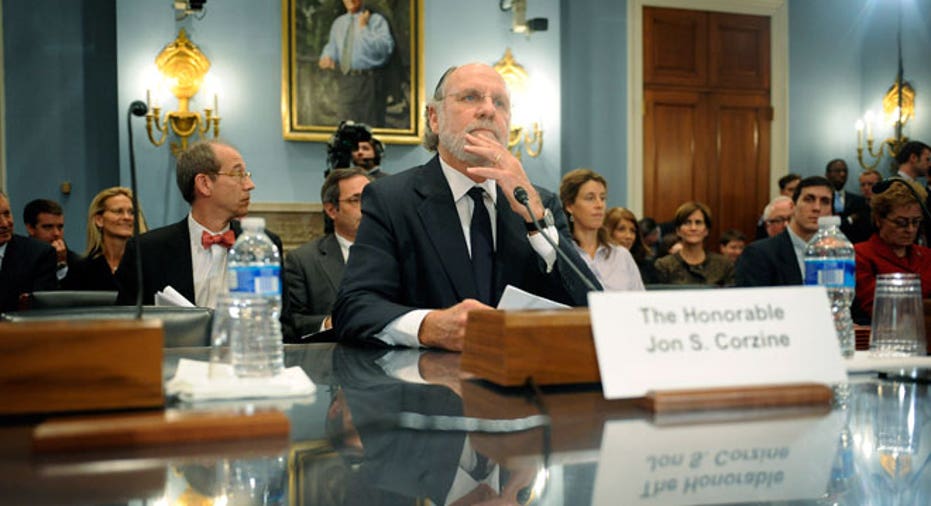MF Global, Jon Corzine, PricewaterhouseCoopers and a Sad Saga: Opinion

Another legal sequel to the sad saga of failed brokerage firm MF Global is playing out this week in a $3 billion blame game involving accounting firm PricewaterhouseCoopers. The trial, dealing with the wonky wake of MFG’s 2011 collapse—and the $1.5 billion-plus that went poof—should be the final chapter in what has seemed like an unending financial fairy tale gone awry.
Now, the legal trial between the Plan Administrator for MFG (who represents the various funds that purchased MFG’s debt after the company declared bankruptcy) and the accounting firm PricewaterhouseCoopers (PwC), which served as MFG’s external auditor, is in full swing. MFG, seeking $3 billion in damages, claims that had PwC advised the company differently, shoddy bets the company made would not have performed so poorly, and MFG might have survived. The facts, however, show that MFG is grasping at straws here, much like their last-ditch efforts to save the company in 2011. What’s more, this time they seem to be seeking a sacrificial scapegoat/sugar daddy in the name of their auditor. James Cusick, a lawyer for PwC, argued that very point on Tuesday in federal court in New York.
In January, MFG’s Chief Executive Officer Jon Corzine, the former New Jersey governor, U.S. senator and Goldman Sachs (NYSE:GS) CEO, was ordered to pay $5 million and permanently banned from the futures industry by the U.S. Commodity Futures Trading Commission (CFTC). The CFTC investigation began in September 2011 while I was a commissioner there and I participated in much of it for nearly two-and-a-half years. Prior to the firm’s downfall, I had several meetings with Mr. Corzine (he in my office and I in his). The governor was intimately aware of what he was doing as MFG took its deep and dark dive into the abyss of financial history. He was hands-on and detail-oriented, but what he and others at MFG wrought was really rotten.
When Corzine took over MFG, he vowed to shake things up. In hindsight, wow—what an understatement. Granted, he began with an enormous challenge. Prior to his arrival on the scene, MFG was losing money, having reported four consecutive quarters of net loss. But instead of crawling out of that hole, Mr. Corzine dug deeper and deeper. MFG took heaping helpings of risky positions on European sovereign bonds—more than $6 billion. As markets turned against him, the margin calls increased (essentially greater down payments on their expanding exposure). Each time, the MFG board approved the governor’s request for greater risk tolerance, which reduced their liquidity and therefore increased their ultimate vulnerability to viability.
Remember, at the time Europe was reeling from the continued economic recession, with gross domestic product for the Eurozone as a whole contracting by 4.5% in 2009. That said, all trading positions on financial circumstances carry risk. Many in the financial sector don’t like when I refer to trading by alternate monikers, but they are in the end simply bets, gambles or wagers. Most times they are carried out by sophisticated professionals, hence the reluctance by many to call them by harsher handles. In MFG’s case, they were really risky wagers.
By the time we in government were finding out the facts and circumstances of the situation, MFG had lost over $100 million, sparking even greater margin calls. At that point, MFG didn’t have the liquidity to pay for the margin calls. Without the dough to maintain the positions, they had to bail from them, taking large losses. In turn, the rating agencies dubbed MFG as “junk” and the company collapsed. This included—infuriating in my mind—a last-ditch effort by MFG to save itself by illegally tapping into what were supposed to be restricted segregated customer funds. Roughly $1.6 billion of those customer funds vanished. Many average people’s investments simply disappeared. This was money they might need for retirement, health expenses or a child or grandchild’s education. Sure, when investing in a brokerage like MFG a loss of some (or even all) is a theoretical possibility. Nevertheless, folks don’t expect what MFG did: Hail Mary terrible trades to try to keep the company afloat. It was one of the most troubling instances of reckless behavior I saw in my seven years as a financial regulator.
Coming full circle, MFG is now doubling down on its bad behavior by suggesting that had PwC not agreed with MFG’s accounting, things might have turned out differently. But technical accounting wasn’t the problem here. The culprits to this calamity were a series of MFG’s own actions including their business strategy, increased risk tolerance and market forces. External auditors don’t (and are restricted by law) from providing business strategy or trading advice. Bottom line: the bets on Europe were just, as Michael Jackson sang, “BAD.” “The word is out, you’re doin’ wrong.” They were bad.
It’s a sorry and sordid circumstance that now, at the end of our story, MFG wants a scapegoat for its risky and reckless behavior. It just goes to prove not all stories end with a happily ever after. Perhaps that’s more the case with financial-oriented fables. They can be sad, bad and sorry.
Former CFTC Commissioner Bart Chilton (2007-14) is a policy and political commentator and author of Ponzimonium: How Scam Artists Are Ripping Off America. He can be reached at bartchilton@bartchilton.com.



















